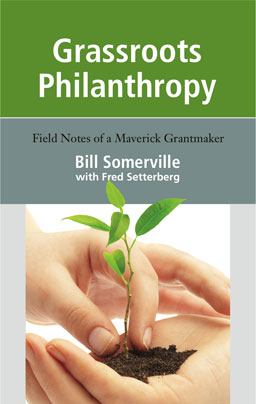Grassroots Philanthropy
Written by Bill Somerville
and Fred Setterberg
Grassroots Philanthropy is a candid critique of the foundation world. With some 67,000 foundations now sitting atop billions of dollars – and almost complete freedom to decide how this money will be spent – the book frankly asks: Why aren’t we – the entire philanthropic sector – doing a much better job?
Published February 2008 by Heyday Books, Berkeley, California. Copies of Grassroots Philanthropy be purchased at Heyday or at Amazon. Grassroots Philanthropy is also available as an audiobook on audible.com. To date, more than 3,000 copies have been sold.
Excerpt from chapter 3, Getting Started (By Getting Our Facts Straight About Foundations):
Philanthropy is a fascinating pursuit. It’s the stuff of dreams made practical, a lever that can move the world. Philanthropy is a subject about which I remain unequivocally and unapologetically passionate.
Yet I don’t sense that passion when I speak with many of my colleagues. And I certainly don’t hear it when I attend the usual round of lectures at national conferences or when I try to plough through treatises and monographs that replace the genuine expression of human feeling with the terminology of management theory.
For me, philanthropy is an emotional subject. And I think that our manner of speaking about philanthropic efforts should reflect our emotional depths. We should strive to project the excitement of philanthropy, inspiring other people to launch their own grantmaking programs – not least, by showing how much satisfaction and (dare I say?) fun our work affords us.
Yet if I may be a bit provocative here, I also want to suggest that the cloudiness of our role in American life may actually suit many people in the foundation world. After all, if nobody is paying attention, we can keep on doing what we’ve always done. We don’t have to worry about public expectations because the public has no expectations. Indeed, the little that most people do seem to believe about philanthropy usually turns out to be wrong.
Bolder, Braver Philanthropy
Nonprofits sum up the imperfections of foundation staff with a single unflattering word: arrogance. While this is certainly a damning appraisal, I think to focus on the unpleasant personal characteristics of some foundation staff actually covers up a far worse systemic flaw. The real problem is not that some foundation executives may simultaneously prove haughty, timid, callous, and hypersensitive. Rather, it’s that the philanthropic sector as a whole fails to embrace the virtues of courage, imagination, curiosity, flexibility, and profound gratitude for the opportunity to play a potentially transformative role in American society. Yes, I know: Individuals create institutions, and any criticism we may harbor about the performance of foundations finally comes down to the attitudes and actions of staff and trustees. But we also must remember that institutions also serve as the crucible that forms – even reshapes – individuals, and that’s particularly true for institutions of enormous wealth, power, and prestige.
If we hope to resuscitate the wasted potential of the foundation world’s vast, independent, and largely unregulated wealth, we must begin everywhere at once – altering our philanthropic institutions by emboldening the individuals at their helms.

Top banner photo credit: Craig Sherod
Bottom banner photo credit: Martin Klimek
“Philanthropy is a fascinating pursuit. It’s the stuff of dreams made practical, a lever that can move the world. Philanthropy is a subject about which I remain unequivocally and unapologetically passionate.”
– Bill Somerville in “Grassroots Philanthropy”


